|
< Earlier Kibitzing · PAGE 2 OF 2 ·
Later Kibitzing> |
Dec-14-18
 | | Annie K.: <OrangeTulip> here: Pun Submission Page :) |
|
| Dec-14-18 | | jith1207: But you would lose Chessbucks for really bad puns. |
|
| Dec-14-18 | | jith1207: Might still be totally worth it. |
|
Dec-14-18
 | | Annie K.: Go ahead, submit, submit, submit! :D
(But don't forget to check <Phony Benoni>'s invaluable <Pun Index Collections> (Game Collection Search) first, to make sure your puns hadn't been used before...) |
|
Dec-14-18
 | | An Englishman: Good Evening: Given that Wolf was one of the great anvils of the era (i.e., he took severe poundings from the great players), it's nice to see him play such a fine attack with simple yet strong moves like 15.Qe3 and 19.Qh4. Starting with 11.Qe3, he makes one threat after another and never lets Black catch his breath. |
|
| Dec-14-18 | | 7he5haman: How about 19...Bf8? |
|
| Dec-14-18 | | Ratt Boy: <fm avari viraf: Black is in real trouble as his pieces are not coordinated. Let us try 21...Bxd6 22.Qd5+ Kh8 23.Qf7 [ even 23.Rxe8+ Qxe8 & 24.Qxf6 wins a pawn with attack ] Rg8 forced any other move looses 25.b4 Nd7 25.Bb3 & wins the exchange.> In your parenthetical line, 24.♕(d5)xf6 is not a legal move.
In your main line, 21...♗xd6 22. ♕d5+ ♔h8 23. ♕f7 ♖g8 24. b4 ♘d7 25. ♗b3 ♗xb4 26. ♕xg8+ ♕xg8 27. ♗xg8 ♔xg8 28. ♖ac1 ♘cb6 29. ♖e7 gives Black two pawns for the Exchange. Doesn't seem terribly resignable. |
|
| Dec-14-18 | | Ratt Boy: Hmm…29.♖e7?? is obviously incorrect. Better 29.♖e4, ♗f8 30.♖ce1 looks good for White…butt I surely wouldn't resign yet. |
|
| Dec-14-18 | | catlover: Nice game and pun. Nobody rescued Petrov from the Wolf in this game. |
|
| Dec-14-18 | | backyard pawn: <Ratt Boy> Wouldn't <fm aver viraf>'s main line conclude with 24. Re8.? So the line would be: 21...Bxd6 22. Qd5+ Kh8 23. Qf7 Rg8 24. Re8.... I think black would be in serious trouble at this point. |
|
Dec-14-18
 | | offramp: I have never liked <Peter & The Wolf>. I first heard it in primary school. A teacher played it to us and as the instruments made their silly noises she was saying things like,
<"Ooo look here comes a little bird... Here come's the big bad wolf... This is Peter skipping along..."> When I listened to it again a while later I couldn't remember who was what, so I assigned famous movie murderers to each of the instruments. The flute is Jason Voorhees, the bassoon is Jack Torrance from <The Shining>, etc. I have a whole scenario going on in my head and everyone sees me grinning thinking that I'm imagining birds and puppies. |
|
| Dec-14-18 | | thegoodanarchist: < offramp: I have never liked <Peter & The Wolf>. I first heard it in primary school.>
It's a song?!?! I didn't know. |
|
| Dec-14-18 | | vonKrolock: <offramp: I have never liked <Peter & The Wolf>.
I first heard it in primary school.>
Most children, I suppose, knew this famous composition from Disney's cartoon with the orchestral version ... It was from start a kind of <musical fairytale> (not a 'song'), originally for piano, by Sergei Prokofiev |
|
| Dec-14-18 | | ChessHigherCat: Here's the cartoon version, narrated by Elmer Fudd. It's pretty faithful to the original, except some of the repetitions are skipped:
https://www.youtube.com/watch?v=TgU...
It dates from 1946, when the US and USSR were still allies. It's great stuff, I grew up on Prokofiev and Shostakovitch, since they were two of my father's favorite composers. If you're lucky you can get your kids to like classical music through the cartoon, so they won't torture you with (c)rap later on. |
|
| Dec-14-18 | | ChessHigherCat: P.S.: I mean the cartoon's from 1946, the music is from 1936. Prokofiev was a great chessplayer, too, by the way: Sergei Prokofiev |
|
| Dec-14-18 | | Count Wedgemore: <CHC: It's great stuff, I grew up on Prokofiev and Shostakovitch, since they were two of my father's favorite composers.> You are very lucky to have been introduced to classical music through your father. Many grow up without ever listening to classical music, and they just can't ever get accustomed to it as grown-ups. It's like they have this prejudice against it, and never get to discover the beauty of it, unlike those who from a young age got to appreciate it, which really is a gift for life. I can't even begin to describe how much people who "never got into" classical music misses out; for these people it's like an important dimension of music is lost forever. |
|
| Dec-14-18 | | ChessHigherCat: <CW: Many grow up without ever listening to classical music, and they just can't ever get accustomed to it as grown-ups. It's like they have this prejudice against it, and never get to discover the beauty of it, unlike those who from a young age got to appreciate it, which really is a gift for life.> Well put. With a lot of people it's a question of class warfare, but that's stupid because almost none of the great composers were aristocrats. Mozart had to eat in the kitchen with the servants and was thrown into a mass grave. |
|
| Dec-14-18 | | thisisasign: 21...Bxd6 22.Rxe8+ Qxe8 23.Qxf6 Qf7, and then what? |
|
| Dec-15-18 | | ChessHigherCat: <thisisasign>
21...Bxd6 22.Bb3+ Ne6
(22...Nxb3?? 23. 23.Qd5+ Kh8 24.Qf7 Rg8 25. Re8 and bye-bye black sheep) 23.Bxe6+ Kh8 (...Rxe6? 24. Qc4!) Bxc8 and white's a piece up. |
|
| Dec-15-18 | | thisisasign: <ChessHigherCat> Thanks! I didn't even consider 22.Bb3+ because of Nxc3. Totally missed Qd5+ in that variation. |
|
Dec-20-18
 | | KEG: A generally fine game by Wolf (apart from his doubtful 18th and 19th moves). The game came to a sudden end after Bardeleben's blunder on move 20. 1. e4 e5
2. Nf3 Nf6
Back in 1900 when this game was played, the Petroff was a way for Black to play for a win. Today, of course, with more than a century of theory available on this opening, the Petroff is a way to seek a draw. 3. Nxe5 d6
4. Nf3 Nxe4
5. d4 d5
6. Bd3 Nc6
7. 0-0 Be7
The wild 7...Bg4!? is the main alternative.
8. Re1
"!"--Tournament Book.
"As Tarrasch teaches." (Tournament Book).
There are, of course, a number of excellent alternatives: 8. Nbd2; 8. c3; 8. Nc3; and perhaps even 8. c4. 8... Bg4
"!"--MCO-13.
9. c4
9. c3, as recommended in MCO-13, is probably best. 9... BxN
9...Nf6, as played by Tahl against Ljubojevic, was sounder and safer. 10. QxB
"!"--Tournament Book.
The position was now:
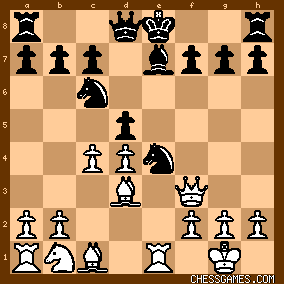
click for larger viewWolf had somewhat the better game at this point, but Bardeleben's position was certainly playable. From here, however, Wolf completely outplayed Bardeleben until he had a clearly won game by move 17. 10... Nxd4
Asking for trouble. 10...Nf6 was best.
11. Qe3
"Starting with 11. Qe3, Wolf makes one threat after another and never lets Black catch his breath." [An Englishman]. I agree with the analysis here by An Englishman through move 17. My only disagreement with his fine analysis here is his thoughts on moves 18-19. 11... Nf5
This allowed Wolf to launch a powerful attack. Bardeleben should have played 11...c5. 12. Qf4
12. Qh3 was perhaps better.
12... Nfd6
13. cxd5 Nc5
14. Bc2 0-0
15. Qe3!
"!"--Tournament Book.
"Simple yet strong." (An Englishman).
15... Nc8
Forced.
16. Nc3
This left:
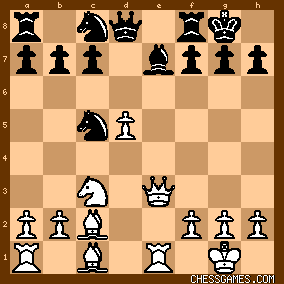
click for larger viewWolf's position at this stage was indeed very strong, but Bardeleben was far from lost. But, as I will discuss in my next post on this game, Bardeleben managed to lose the game in just five moves. As happened so often at Munich 1900, Bardeleben--perhaps because of illness--fell apart in a number of games and lost some very short games. |
|
Dec-20-18
 | | KEG: Post II
In the diagrammed position with which I ended my last post, Bardeleben, though definitely having the worst of the struggle, could still have had chances with 16...Re8! It is hard to see anything resembling a winning line for White after 16...Re8. But instead Bardeleben played: 16... Bd6?
Wolf now had a clear win with 17. b4! (17...Nd7 18. Qh3 and now if 17...g6 18. Ne4!--threatening Bb2 and Bb3 with a crushing attack). Wolf's actual move was nearly as good:
17. Qh3
The position was now:
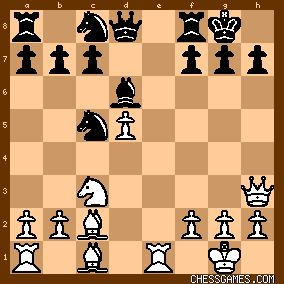
click for larger viewThreatened with mate, Bardeleben had little choice: 17... g6
What else? If 17...h6? 17. Bxh6! White can also win here with 17. b4! Nd7 18. Bxh6! 18. Bh6
This looks good, but 18. b4 (giving him access to e4) was even better and probably sufficient for a win. 18... Re8
The alternative, sacrificing the exchange with 18...Nb6, was apparently not to Bardeleben's liking. The text was probably the best move at his disposal The position now was:
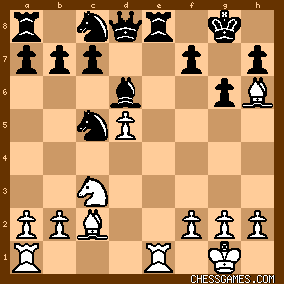
click for larger view19. Qh4?
"Simple yet strong." [An Englishman].
While An Englishman's analysis is generally spot on, here I must dissent. Wolf should have played the much stronger 19. Nb5 (making room for 20. Qc3!). With the text, Bardeleben was suddenly back in the game. 19... Be7
"?"--Tournament Book.
The Tournament Book's commentary on this game seems to be from Mars. Its suggestion of 19...Nb6 was not bad, but the text was probably best. Most definitely, White has no winning position after the text. 20. Qd4!
White's best chance. He cannot afford to give Bardeleben a moment's respite. The position now was:
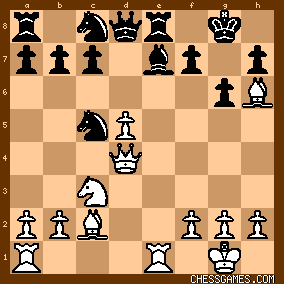
click for larger viewBardeleben could have defended himself with 20...Bf8! [e.g., 21. BxB RxR+! (essential but sufficient) 22. RxR QxB and Black is alive and kicking. But instead of the essential 20...Bf8!, Bardeleben made the fatal blunder: 20... f6?
Now the game was gone in light of:
21. d6!
This left:
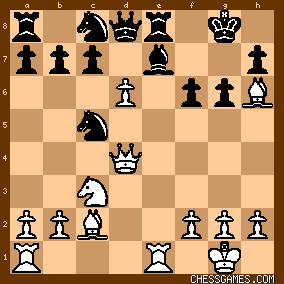
click for larger viewBardeleben here quite appropriately resigned.
There has, however, been considerable discussion on this site as to whether Bardeleben's resignation was premature and whether in fact White has a won game here. I will address these issues and attempt to demonstrate that Bardeleben was quite lost in the final position. |
|
Dec-21-18
 | | KEG: Post III
In the final position in which Bardeleben resigned, two moves have been suggested as ways to hold off the White attack after 21...d6!: (A) 21...cxd6; and (B) 21...Bxd6. Neither move saves the game for Black. (A) If 21...cxd6 (suggested by electrobyte), White wins with 22. Qd5+ Kh8 23. Qf7 Rg8 and now--as pointed out by Honza Cervenka--Black is crushed by 24. Nd5! Nd7 25. RxB! NxR (25...QxR is the only way to extend the game for even a few moves) 26. Nxf6 Nf8 (or 26...NxN 27. QxN+ and mate next move) 27. BxN and mate next move. BRAVO [Honza Cervenka].
(B) 21...Bxd6 loses. Following the line of fm avari viraf, White wins easily with 22. Qd5+ Kh8 [22...Ne6, though hopeless, is the only way to prolong the game] 23. Qf7 Rg8 24. b4 and now if 24...Nd7 as suggested by Ratt Boy White wins with 25. Rad1 [much better than Ratt Boy's 25. Bb3]. Even better in the above line is the lovely 24. Re8 as noted by [backyard pawn] after which White mates in at most 3 moves. BRAVO backyard pawn. Best of all after 21...Bxd6 is 22. Bb3+ as pointed out by [ChessHigherCat]. If then 22...Ne6 (22...Re6 would allow Black to hang on a bit longer but is obviously hopeless) 23. BxN+ Kh8 24. BxN (following ChessHigherCat's line). BRAVO ChessHigherCat
23. RxN! also wins in the above line.
In any case, it looks clear that Bardeleben was busted after 21 d6! His resignation was not premature. |
|
Dec-25-18
 | | An Englishman: Good Morning: Good work, <KEG>! Thank you for the feedback. 17.b4 and 18.b4 do look convincing. In a later era, Alekhine would have found the move, given his mastery of conducting an attack over the entire board. |
|
Dec-25-18
 | | KEG: <An Englishman> Thank you. And thank you for your analysis of this game which I found helpful. |
|
 |
|
< Earlier Kibitzing · PAGE 2 OF 2 ·
Later Kibitzing> |





